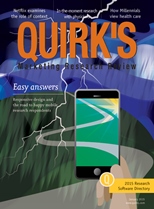Editor’s note: Tamara Deprez is founder and managing partner of Dubai-based marketing consulting firm The360mix. Deprez can be reached at tamara@the360mix.com. Maha Ahmad is partner of The 360mix and can be reached at maha@the360mix.com.
A decade ago, the Middle East and North Africa (MENA) knew marketing mainly through traditional advertising, public relations, industry events and trade shows. No one imagined it could be done differently.
In recent years the Internet penetration in the MENA region has been growing at a remarkable pace, reaching the global average in 2014 for the very first time. This is coupled with a mobile penetration rate that is estimated at 110 percent and a social media penetration that is often at a higher rate than the world’s top 10.
Due to the constant increase in use of computer and mobile technologies, more and more organizations have integrated new media into marketing plans. They are slowly but surely becoming used to the concepts of digital, social media and e-mail marketing, as well as online market research.
The business of social media in the MENA region
Facebook is the most popular social media network in the MENA region, with over 81 million users, followed by LinkedIn with about 8.5 million and Twitter with 6 million users. At a recent information session held by YouTube for Google Partners in Dubai, United Arab Emirates, figures were shared to illustrate that Saudi Arabia has the world’s top per capita users of YouTube.
As social media continues to grow in the region, organizations are learning how to manage their reputation in an environment where they have increasingly less control over how their brand is managed, due to the fast, free flow of ideas on social media networks.
Advertisers and marketers are engaging more and more with social media platforms in order to monitor and influence opinions of their brands. There are now at least five high-quality providers of Arabic social media monitoring services in the United Arab Emirates, giving brands real-time visibility on what people are saying about their products or services.
Even though organizations are still investing heavily in traditional advertising, digital and social media marketing are taking in a bigger share year by year.
In the past, not many Dubai organizations developed a customer database, primarily because of the rapid economic growth and the inability for marketers to keep up with the pace of development. This led to professionals forming their own marketing strategies without significant research to back up such strategies.
One of the changes in the last few years has been the integration of sophisticated database software – often in conjunction with a customer relationship management system – to keep up in today’s competitive environment and increase both sales and customer satisfaction, which in turn leads to a higher demand for e-mail and SMS marketing.
Online research becoming slowly more palatable
The market for online research has been moving very fast in Europe and the U.S. and although the MENA region remains the smallest it is set to see dramatic growth, looking at the number of new Internet users every year and the number of local market research firms adopting this innovative method.
For example, MENA Opinion recently launched Researchii, an online community that rewards members for taking part in surveys and polls. Targeted at the general public, Researchii aims to create a community of consumers who participate in online surveys and polls on topics that concern their specific areas of interest.
The growth of Internet penetration means that online research is more important than ever for regional advertisers. With sufficient online research, advertising companies will now be able to effectively target the correct demographic, gender, age range, interests and habits (such as when a user most frequently logs on) to enable a value-for-money, personalized, time-effective online advertising campaign.
A large number of organizations have already started integrating fully-fledged new media campaigns into their marketing budgets. Others are catching on slowly, and marketing experts can help fill this gap and educate businesses on the importance of this new and exciting age of unprecedented marketing initiatives.
